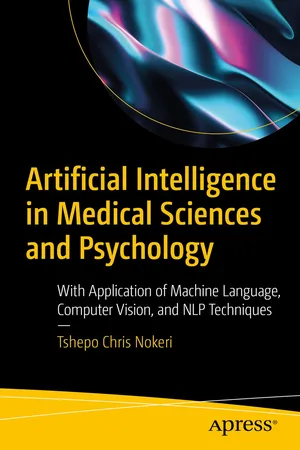
Artificial Intelligence in Medical Sciences and Psychology
With Application of Machine Language, Computer Vision, and NLP Techniques
- English
- ePUB (mobile friendly)
- Only available on web
Artificial Intelligence in Medical Sciences and Psychology
With Application of Machine Language, Computer Vision, and NLP Techniques
About This Book
Get started with artificial intelligence for medical sciences and psychology. This book will help healthcare professionals and technologists solve problems using machine learning methods, computer vision, and natural language processing (NLP) techniques.
The book covers ways to use neural networks to classify patients with diseases. You will know how to apply computer vision techniques and convolutional neural networks (CNNs) to segment diseases such as cancer (e.g., skin, breast, and brain cancer) and pneumonia. The hidden Markov decision making process is presented to help you identify hidden states of time-dependent data. In addition, it shows how NLP techniques are used in medical records classification.
This book is suitable for experienced practitioners in varying medical specialties (neurology, virology, radiology, oncology, and more) who want to learn Python programming to help them work efficiently. It is also intended for data scientists, machine learning engineers, medical students, and researchers.
What You Will Learn
- Apply artificial neural networks when modelling medical data
- Know the standard method for Markov decision making and medical data simulation
- Understand survival analysis methods for investigating data from a clinical trial
- Understand medical record categorization
- Measure personality differences using psychological models
Who This Book Is For Machine learning engineers and software engineers working on healthcare-related projects involving AI, including healthcare professionals interested in knowing how AI can improve their work setting
Frequently asked questions
Information
Table of contents
- Cover
- Front Matter
- 1. An Introduction to Artificial Intelligence in Medical Sciences and Psychology
- 2. Realizing Patterns in Diseases with Neural Networks
- 3. A Case for COVID-19: Considering the Hidden States and Simulation Results
- 4. Cancer Segmentation with Neural Networks
- 5. Modeling Magnetic Resonance Imaging and X-Rays by Executing Artificial Neural Networks
- 6. A Case for COVID-19 CT Scan Segmentation
- 7. Modeling Clinical Trial Data
- 8. Medical Records Categorization
- 9. A Case for Psychology: Factoring and Clustering Personality Dimensions
- Back Matter